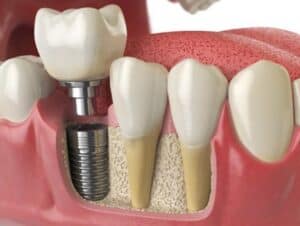Are you tired of dealing with sore, bleeding gums or loose teeth? Do you worry about the success of your dental implants? You’re not alone. Many people struggle with gum disease, which can lead to tooth loss and implant failure. But there’s hope! Periodontal Surgery.
Did you know that nearly half of all adults over 30 have some form of gum disease? That’s where periodontal surgery comes in. This essential guide will walk you through the different types of gum surgeries, how they can improve your oral health, and what to expect during the process.
Get ready to say goodbye to gum woes and hello to a confident smile.
Key Takeaways
- Periodontal surgery is crucial for treating gum disease, preventing tooth loss, and ensuring the success of dental implants. Nearly half of all adults over 30 have some form of gum disease.
- Common types of periodontal surgery include gum grafting to cover exposed roots, pocket reduction surgery to remove harmful bacteria and secure gums around teeth, crown lengthening to improve gum health and smile appearance, and dental implant placement to restore missing teeth.
- Dr. West and Dr. Zeren at West Periodontics & Dental Implants in Timonium, MD, are experienced periodontists who provide personalized treatment plans using state-of-the-art technology like 3D imaging, laser therapy, and computer-guided implant placement. They prioritize patient comfort and satisfaction.
- Proper preparation, recovery, and aftercare are essential for successful periodontal surgery outcomes. This includes consulting with a periodontist, following at-home care instructions like gentle brushing and saltwater rinses, attending follow-up appointments, and being aware of potential complications such as pain, swelling, bleeding, infection, sensitivity, and gum recession.
- Throughout the periodontal surgery journey, Dr. West and Dr. Zeren offer comprehensive support to their patients at their Timonium, MD practice, ensuring a smooth recovery and optimal long-term results for improved gum health and smile confidence.
Why Periodontal Surgery is Important for Gum Health and Dental Implant Success

Gum disease can wreak havoc on your oral health, causing painful inflammation, receding gums, and even tooth loss. When non-surgical treatments like scaling and root planing fall short, periodontal surgery steps in as the superhero to save the day, fighting off the villainous plaque and bacteria to restore your gum health and protect your pearly whites.
Keeping Your Gums Healthy: Prevention is Key
Gum disease, like gingivitis and periodontitis, can wreak havoc on your oral health if left unchecked. The good news? You have the power to prevent it! Regular brushing, flossing, and visits to your dentist or periodontist are your secret weapons against plaque and tartar buildup.
These simple habits keep harmful bacteria at bay, protecting your gums and teeth from infection and damage.
If gum disease does strike, don’t panic. Your dental team has an arsenal of treatments to get your gums back on track. From deep cleaning (scaling and root planing) to antibiotics and surgical procedures like flap surgery or grafting, they’ll work with you to find the best solution for your unique needs.
Periodontal Surgery: A Solid Foundation for Dental Implant Success
Transitioning from preventing and treating gum disease, periodontal surgery also plays a crucial role in providing a stable base for dental implants. Just like a house needs a strong foundation, dental implants require healthy gum tissue and bone to anchor them securely in place.
Periodontal procedures such as bone grafting and tissue regeneration can help rebuild lost bone and gum tissue, creating an optimal environment for implant placement. This solid foundation not only improves the chances of successful implant integration but also contributes to the long-term stability and function of your new teeth.
At our practice, we understand that every patient’s needs are unique. That’s why our periodontists take a personalized approach to periodontal surgery and implant dentistry. They carefully assess your oral health, discuss your goals, and develop a tailored treatment plan that addresses your specific concerns.
With their expertise and state-of-the-art techniques, they can help you achieve a healthy, beautiful smile that you can confidently show off. Don’t let periodontal issues hold you back from enjoying the benefits of dental implants.
Overall oral health improvement
Periodontal Surgery: A Powerful Tool for Better Oral Wellness
Periodontal surgery isn’t just about fixing gum issues – it’s a gateway to a healthier mouth overall. By getting rid of harmful bacteria and restoring the gums, this treatment can help keep your pearly whites in tip-top shape.
Plus, it lays the groundwork for successful dental implants, so you can flash a full, confident smile.
Think of your gums as the trusty sidekicks to your teeth. When they’re not in good condition, it can lead to all sorts of trouble, like tooth loss and infections that spread throughout your body.
Gum Grafts, Pocket Reduction, and More: Your Guide to Periodontal Surgery Types

From gum grafting to pocket reduction, periodontal surgery comes in many forms. Let’s explore the most common types of gum surgery that can help you regain a healthy smile and support dental implants.
Gum Grafting: Restoring Your Smile and Protecting Your Teeth
If your gums have receded, exposing the roots of your teeth, gum grafting can help. This surgical procedure involves taking tissue from another part of your mouth, like the roof of your mouth, and attaching it to the affected area.
Gum grafting covers exposed roots, reduces tooth sensitivity, and improves the appearance of your smile. It also helps protect your teeth from further damage caused by gum recession.
At West Periodontics & Dental Implants in Timonium, MD, Dr. West and Dr. Zeren specialize in gum grafting and other periodontal surgeries. They use the latest techniques and technology to ensure your comfort and achieve the best possible results.
Pocket Reduction Surgery: A Gum-Saving Solution
Gum disease can wreak havoc on your oral health. It starts with plaque buildup, which leads to tartar. Tartar irritates the gums, causing them to pull away from the teeth. This creates pockets where bacteria thrive.
As the pockets deepen, the infection worsens. If left untreated, it can destroy the bone supporting your teeth. That’s where pocket reduction surgery comes in. This periodontal procedure involves folding back the gum tissue, removing the harmful bacteria, and securing the gums snugly around the teeth.
It’s like giving your gums a fresh start.
Pocket reduction surgery isn’t just about treating gum disease. It also paves the way for successful dental implants. Implants need healthy gums and bone to anchor them in place. If you have deep pockets, the implant may not have enough support.
Crown Lengthening: Reshaping Gums for a Healthier Smile
Crown lengthening is a surgical procedure that helps improve your gum health and the appearance of your smile. During this treatment, our skilled periodontists carefully remove excess gum tissue and, if needed, a small amount of bone to expose more of your natural tooth structure.
This process not only enhances the aesthetics of your smile but also creates a more stable foundation for future dental work, such as crowns or veneers.
At West Periodontics & Dental Implants, we use advanced techniques and state-of-the-art equipment to perform crown lengthening procedures with precision and care. Our experienced team, led by Dr.
Dental Implant Surgery: Restoring Your Smile and Confidence
Dental implant placement is a common periodontal procedure that can help restore missing teeth and improve your oral health. During this surgery, a titanium post is inserted into the jawbone to serve as an artificial tooth root.
Over time, the implant fuses with the bone, providing a stable foundation for a crown, bridge, or denture. Dr. West and Dr. Zeren at West Periodontics & Dental Implants in Timonium, MD, are experts in dental implant surgery and can help you achieve a beautiful, functional smile.
Before placing dental implants, your periodontist may recommend other types of periodontal surgery, such as crown lengthening or connective tissue grafting, to ensure the best possible outcome.
Benefits of Choosing West Periodontics & Dental Implants for Periodontal Surgery
At West Periodontics & Dental Implants, our dynamic duo of Dr. West and Dr. Zeren bring a wealth of experience and dedication to the table, ensuring that your gums and implants are in the best hands possible.
Our state-of-the-art facility in Timonium, MD is equipped with the latest technology and tools, like the LANAP protocol and ARESTIN microspheres, to provide you with the most effective and comfortable periodontal treatments around.
Experienced and dedicated doctors, Dr. West and Dr. Zeren
The seasoned periodontists at this practice are dedicated to helping you achieve a healthy and stunning smile. With years of experience in periodontology and dental implantology, they have helped countless patients improve their oral health and confidence.
One of the periodontists has a unique background, having served in the U.S. Navy and treated medically-compromised veterans with disabilities. During his service, he completed clinical rotations at prestigious facilities such as the Marine Corps Recruit Depot in San Diego and Walter Reed National Military Medical Center, where he gained expertise in the latest techniques and treatments.
But what sets these periodontists apart is their genuine care for their patients’ well-being. They take the time to listen to your concerns, explain your options in easy-to-understand terms, and develop a personalized treatment plan that suits your specific needs and budget.
State-of-the-art facility in Timonium, MD
At this cutting-edge facility, they’ve invested in the latest dental technology. The Timonium office boasts advanced tools like 3D imaging, laser therapy, and computer-guided implant placement.
These innovative gadgets allow the doctors to perform periodontal surgeries with incredible precision and efficiency.
But it’s not just about the fancy equipment. They’ve designed the space to be warm, welcoming, and dare we say, even a little fun. From the comfy chairs to the soothing decor, every detail is crafted to help you feel at ease.
Tailored Treatment Plans for Your Unique Smile
At West Periodontics & Dental Implants, we know that no two smiles are alike. That’s why Drs. West and Zeren create custom treatment plans for each patient. They use the latest tools, like 3D imaging and microscopes, to get a clear picture of your gums and teeth.
This helps them choose the best procedures for you, such as gum grafting or pocket reduction surgery. They’ll walk you through each step and answer all your questions. Their goal? To help you achieve a healthy, confident smile that lasts a lifetime.
Your Comfort Is Our Top Priority
We understand that periodontal surgery can seem intimidating. That’s why our doctors go above and beyond to ensure your comfort and satisfaction every step of the way. From our inviting office atmosphere to our gentle touch and advanced anesthesia options, we’ll help you feel at ease during your treatment.
Plus, our state-of-the-art facility is equipped with the latest technology to make your procedure as efficient and comfortable as possible.
We know that a stress-free experience is crucial for a successful outcome. That’s why our team takes the time to listen to your concerns, answer your questions, and create a personalized treatment plan that fits your unique needs.
Get Ready for a Smooth Recovery: Your Guide to Periodontal Surgery Prep and Aftercare
Dr. West and Dr. Zeren will walk you through the steps to prepare for your periodontal surgery, from the initial consultation to post-op care, ensuring a comfortable experience and optimal healing at their state-of-the-art Timonium, MD practice.
Keep reading to learn more about what to expect and how to achieve the best results for your gum health and smile.
Consult a Periodontist: Your Key to Successful Periodontal Surgery
Consulting a periodontist is a crucial step in preparing for periodontal surgery. A periodontist specializes in the prevention, diagnosis, and treatment of periodontal disease and can help you achieve optimal results from your procedure.
During your consultation, you can expect:
- Comprehensive examination: Your periodontist will thoroughly examine your teeth, gums, and mouth to assess the severity of your periodontal disease and determine the best course of action.
- Discussion of treatment options: Based on your specific needs and goals, your periodontist will discuss the various types of periodontal surgery available, such as gum grafting, pocket reduction surgery, or crown lengthening.
- Personalized treatment plan: Your periodontist will develop a customized treatment plan tailored to your unique situation, taking into account factors such as your overall health, lifestyle, and preferences.
- Explanation of the procedure: Your periodontist will walk you through the details of the recommended surgical procedure, including what to expect before, during, and after the surgery.
- Addressing concerns and questions: This is an opportunity for you to ask any questions you may have about the procedure, recovery process, or potential risks and complications.
- Pre-operative instructions: Your periodontist will provide you with specific instructions on how to prepare for your surgery, such as dietary restrictions, medications to avoid, and arrangements for transportation.
- Discussion of post-operative care: Your periodontist will outline the steps you’ll need to take to ensure a smooth recovery, including pain management, oral hygiene practices, and follow-up appointments.
By working closely with your periodontist during the consultation process, you can feel confident and well-informed about your upcoming periodontal surgery, setting the stage for a successful outcome and improved oral health.
Recovery Matters: Your Post-Periodontal Surgery Checklist
Proper at-home care is essential for a smooth recovery after periodontal surgery. Following your periodontist’s instructions diligently can help prevent complications and promote optimal healing.
Your post-surgery care checklist should include:
- Gentle brushing: Use a soft-bristled toothbrush to clean your teeth, avoiding the surgical site for the first few days. Gradually resume brushing the area as it heals, using light pressure.
- Saltwater rinses: Gently swish with warm salt water (1/2 teaspoon salt mixed with 8 ounces of water) several times a day, especially after meals, to keep the surgical site clean and reduce inflammation.
- Pain management: Take prescribed pain medications or over-the-counter options like ibuprofen as directed to manage discomfort. Apply an ice pack to the outside of your cheek for the first 24-48 hours to minimize swelling.
- Soft food diet: Stick to soft, easy-to-chew foods like smoothies, scrambled eggs, and mashed potatoes for the first few days. Gradually incorporate solid foods as your healing progresses.
- Avoid smoking and alcohol: Refrain from smoking and consuming alcohol for at least 72 hours after surgery, as these habits can delay healing and increase the risk of complications.
- Rest and relaxation: Take it easy for the first few days, avoiding strenuous activities and exercise. Elevate your head while sleeping to reduce swelling and promote comfort.
- Attend follow-up appointments: Schedule and attend all post-operative check-ups with your periodontist to monitor your healing progress and address any concerns promptly.
Follow-up appointments and potential complications
After your periodontal surgery, your journey to recovery begins. Your periodontist will provide you with detailed instructions to ensure a smooth healing process.
Here’s what you can expect during follow-up appointments and potential complications:
Follow-up Appointments:
- Scheduling: Your periodontist will schedule a follow-up appointment 1-2 weeks after your surgery to monitor your healing progress and remove any stitches if necessary.
- Examination: During the follow-up visit, your periodontist will examine the surgical site to ensure proper healing and check for any signs of infection or complications.
- Oral Hygiene Instructions: Your periodontist will review and reinforce proper oral hygiene techniques to maintain the health of your gums and teeth post-surgery.
- Future Appointments: Depending on your individual case, additional follow-up appointments may be scheduled to track your progress and make any necessary adjustments to your treatment plan.
Potential Complications:
- Pain and Swelling: Some discomfort and swelling are normal after periodontal surgery. Your periodontist may prescribe pain medication and recommend cold compresses to manage these symptoms.
- Bleeding: Slight bleeding or oozing from the surgical site is common for the first few days. If excessive bleeding occurs, contact your periodontist immediately.
- Infection: Although rare, infections can occur after periodontal surgery. Signs of infection include severe pain, swelling, fever, and discharge from the surgical site. If you experience these symptoms, contact your periodontist promptly.
- Sensitivity: Your teeth may feel more sensitive to hot and cold temperatures after surgery. This sensitivity usually subsides within a few weeks as your gums heal.
- Gum Recession: In some cases, gum recession may occur after periodontal surgery, exposing more of the tooth root. Your periodontist will monitor this and provide appropriate treatment if necessary.
Remember, attending your follow-up appointments and promptly addressing any complications are crucial for a successful recovery and optimal long-term results. Dr. West and Dr. Zeren at West Periodontics & Dental Implants in Timonium, MD, are dedicated to providing comprehensive support throughout your periodontal surgery journey.
Comprehensive support from Dr. West and Dr. Zeren at their Timonium, MD practice.
Following your surgery, your periodontists will be your guides on the road to recovery. They’ll give you detailed instructions on how to care for your mouth at home, including tips on brushing, flossing, and using any prescribed rinses or medications.
You’ll also have regular check-ups at their state-of-the-art office to make sure your gums are healing properly and to catch any potential complications early.
Your periodontists understand that recovering from periodontal surgery can be challenging, both physically and emotionally. That’s why they offer comprehensive support throughout the entire process.
FAQs
1. What is periodontal surgery and why might I need it?
Periodontal surgery, also known as gum surgery, is a dental procedure that treats gum disease. If you have severe gum disease or infection, your dental surgeon may recommend surgery to repair damage and prevent tooth loss.
2. What are the different types of periodontal surgery?
There are several types of surgical treatments for gum disease, depending on the severity. These include osseous surgery to reshape bone and tissue, guided tissue regeneration to encourage bone and tissue growth, and free gingival grafts using donated tissue.
3. How do I know if I’m a candidate for periodontal surgery?
If you have advanced gum disease that’s causing significant bone loss or deep periodontal pockets, you may benefit from periodontal surgery. Your dental professional will assess the severity of your gum disease and recommend the best treatment option.
4. What can I expect from periodontal surgery?
The specifics of your periodontal surgery will depend on the type of procedure you need. In general, the surgery aims to remove tartar and bacteria, repair damaged tissue, and encourage healthy bone and tissue growth. You may experience some discomfort and swelling after the procedure.
5. Can periodontal surgery help prevent tooth loss?
Yes! By treating severe gum disease and repairing damage, periodontal surgery can help prevent tooth loss. Maintaining good oral hygiene after surgery is crucial for long-term success.
6. How do I schedule an appointment for periodontal surgery?
If you’re showing signs of gum disease or your dental professional has recommended periodontal surgery, don’t wait! Contact a qualified dental surgeon to schedule an appointment and discuss your treatment options. Taking action now can save your smile for years to come.






